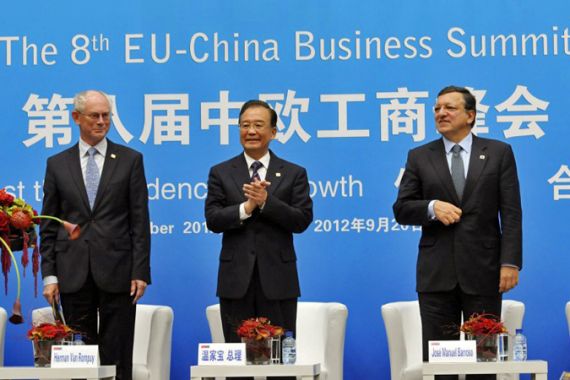Chinese PM urges EU to drop arms embargo
Wen Jiabao tells summit in Brussels that embargo imposed following the suppression of student protests should be lifted.

Chinese Prime Minister Wen Jiabao has urged EU leaders to end the arms embargo on China, while pledging help to resolve the region’s debt crisis on his last overseas trip as premier.
“I have to be very frank in saying this,” Wen said on Thursday in Brussels. “The two issues of lifting the arms embargo against China and recognizing China’s full market economy status, we have been working hard for ten years. But the solution has been elusive. I deeply regret this.”
The EU arms embargo against China was imposed in 1989 following the suppression of protests in Tiananmen Square. France and Spain have been calling for a review of the policy, but Britain has been steadfast in keeping the sanction in place.
At the summit, Wen met with Van Rompuy, the European Council president, head of the EU commission Jose Manuel Barroso and EU foreign policy head Catherine Ashton.
Apart from Wen’s call to end the embargo, the leaders kept the meeting on a more friendly note with Barroso pointing to the significant increases in trade between China and Europe over the past decade including 280 per cent in goods and 380 per cent in services.
The 27-state EU bloc is China’s single largest export market, while China is the EU’s second-largest trading partner after the United States, with total trade worth nearly $557bn in 2011.
“Your role has been essential in bringing us to where we are today,” Van Rompuy was quoted by news reports praising Wen. “We have reached a level of mutual understanding and respect.”
Wen also began on a friendly note pointing to China’s continued purchases of European government bonds in recent months and co-operation with the new eurozone rescue fund, the European Stability Mechanism.
“China is a firm supporter of European integration,” he said. And, in an apparent sideswipe at the United States, he added: “We both support a multipolar world and oppose unilateralism.”
EU slowdown
The meeting is critical to both parties but more so for the EU.
Beijing has repeatedly expressed concern about the EU slowdown and offered help in resolving the debt crisis but at the same time has been increasingly forced to take costly stimulus steps of its own to sustain growth.
Wen had told visiting German Chancellor Angela Merkel last month that despite “serious concerns”, Beijing was ready to continue investing in eurozone sovereign debt markets “on condition of fully evaluating the risks”.
He also said China was ready to strengthen communication and discussion with the EU, the European Central Bank, the International Monetary Fund and key countries to support indebted eurozone nations.
Europeans have expressed hope that China could deploy some of its trove of about $3tn in foreign exchange reserves – the largest in the world to invest in EU bailout funds.
Wen’s visit comes, however, with the European debt situation showing some improvement after the ECB announced a bold plan to buy government bonds so as to cut borrowing costs for under-pressure eurozone economies.
That move is in turn linked to the bloc’s new bailout fund, which was finally cleared earlier this month by Germany’s top constitutional court, allowing full implementation.
In Brussels, EU sources said the talks would consolidate ties ahead of major Chinese leadership changes, due later this year and early next, and “it is not a summit for big decisions”.
Given the adverse economic backdrop, it would be important that both sides give a strong signal of “mutual confidence” in the future, the source added.
While stressing the positives, the EU source also recognised a long list of disputes but argued that they were only to be expected give the importance of the relationship as a whole.
Contentious issues
Other contentious issues to be covered will likely include human rights in China, and Syria and Iran on which Beijing has opposed activist Western policies, the sources said.
Thomas Koenig, London-based China programme co-ordinator with the European Council on Foreign Relations, said he would be looking to see if the crisis had eased sufficiently for the EU to assume a more robust stance towards Beijing.
“With China, it’s always important to emphasise reciprocal engagement,” Koenig said, adding he was hoping for a “little more candid assessment of the situation” in the relationship.